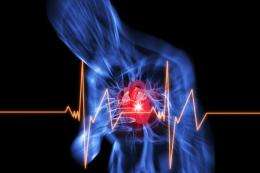Chest pain: When conventional treatments don't work

Tens of thousands of Canadians seek emergency services and are referred for angiograms each year to investigate sources of chest pain. For approximately half a million Canadians, chronic chest pain – or, specifically, refractory angina – is a devastating disease. Refractory angina is not only painful but is also frightening and debilitating. There have been no specific Canadian guidelines for treating this population until now. Thanks to the joint research at U of T and McMaster, new guidelines will help provide feasible options for cardiac pain management for patients suffering from refractory angina. Writer Anjum Nayyar spoke with researcher and professor of nursing Michael McGillion about the new guidelines.
Why was it necessary to draft new chest pain guidelines?
These are refractory angina guidelines. People who have this kind of chronic angina don’t respond to conventional treatments for heart disease. They have a chest pain problem that continues despite maximal medical therapy: traditional medications, bypass surgery, nitrate therapy – these treatments don’t work for them. These patients really become a specialized group, and there were no specific guidelines for treating this kind of population. And as with other forms of chronic pain, chronic pain mechanisms can kick in for these patients. The guidelines are really about combining the efforts from a cardiology point of view and also from a chronic pain-related treatment point of view.
How do the new guidelines change the way doctors will treat and diagnose chest pain?
The guidelines bring together approaches that would not typically be conventional in cardiology. These patients typically fall through the cracks – sometimes they’re called ‘no option angina’, but calling them ‘no option’ is really not helpful, so our first recommendation is that this condition be recognized as ‘refractory angina’. Even if we’ve done our duty in terms of addressing the heart disease, these patients have a real physiological problem with their chest pain. One of the recommendations we make is that cardiovascular experts and pain experts work together on joint assessments to treat these patients. Then it’s really about understanding the ischemic and neural pain mechanisms involved. The key message is we’ve got to understand these patients from both lenses. Traditionally those two worlds have not formally worked together.
How common is refractory angina?
We know in the US it affects between 600,000 and 1.8 million people with 50,000 cases a year. And in continental Europe, there are between 30,000 and 50,000 new cases a year as well. In Canada we don’t have the right tracking system for refractory angina as yet but data from the Canadian Community Health Survey tell us that we have about 500,000 people that live with unresolved angina. A good portion of those people are likely to have this problem. We know, for example, that up to 50% of patients who undergo angioplasty or bypass surgery for heart disease can end up with a recurrent chest pain problem.
What are some of the biggest misconceptions about angina?
One of the biggest misconceptions is that the pain is not real. It’s actually quite devastating because every time a person has it, higher brain centres tell them that they are in danger. It’s very debilitating when this experience is chronic.
How will the new guidelines influence future clinical practice and research in this area?
We point out the gaps in research. One of the key recommendations we make is that there be specialized centres to have a combined system of training. We know now of the most promising direction for some people. We know, for example, that spinal cord stimulation is really quite effective to improve functional status for many. But we need policy because it’s a highly specialized approach. A less resource-intensive approach is cognitive self-management training. This approach is effective for helping people with refractory angina to be less afraid and more functional, but it’s currently not routinely available.















